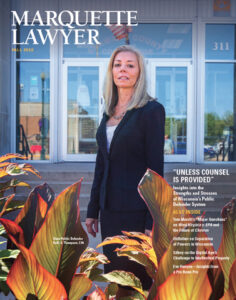Restorative Justice Week, running from November 20 to November 26, seeks to highlight the significance of access to restorative approaches to address harm. This week is for celebrating, raising awareness, organizing events, for restorative justice.
Too many people affected by harm do not have access to restorative practices which can lead to healing. These processes seek to bring survivors, perpetrators, and community members together for facilitated conversations to promote accountability and transformation. Restorative justice approaches are ingrained in many indigenous cultures in numerous kinds of conflicts. Restorative Justice focuses on the harm and ripple effects of harm created by wrongful acts by encouraging victims to share the trauma they have suffered, for perpetrators to take responsibility for what they have done and for communities to work on safety and healing.
Family survivors of homicide victims, like Dr. Mary Kay Balchunas, who recently held a public conversation with Professor Janine Geske at Marquette University Law School, reflected on the positive impact Restorative Justice had for her. Mary Kay, the mother of a murdered law enforcement officer, has not yet met with the perpetrators who killed her son. However, Mary Kay did participate in restorative justice circles with other serious offenders at Green Bay Correctional Institute with Professor Geske and her students. In those circles, Mary Kay shared her story with a group of inmates, victims, and other community members. It was through that process of sharing her story and experiences that Mary Kay was able to find her path to healing. Professor Geske and her law students have worked with other victims, ranging from mothers to fathers, daughters to sons, brothers to sisters, community members to perpetrators. Those participants have all expressed similar experiences as they felt the positive impact that Restorative Justice seeks to promote.
Access to restorative processes provide an efficient and effective way of promoting understanding and healing for the wounds associated with crime and other harms. These approaches also positively impact the greater community. When victims, offenders, and community members come together with a trained facilitator to share their experiences and stories, each person feels heard. We learn that communities are also harmed by crime even if each resident is not a direct victim of a crime. For example, when a university sends out the safety warning texts – which usually notifies students and the university community that an armed robbery occurred nearby, it invokes fear throughout the campus. That fear harms the greater community. For instance, some people may not feel safe leaving their residence hall or begin avoiding certain areas of the city out of fear that they could be the next victim. Restorative Justice seeks to bring everyone affected together to come to a common understanding and agreement on how that harm can be best repaired. Every step taken towards healing is a step in the right direction.
With the opening of the Andrew Center for Restorative Justice about a year ago, Marquette Law School has promoted the efficacy, availability, and access to Restorative Justice. The Andrew Center for Restorative Justice recently appointed a new director for 2023 – Milwaukee County Chief Judge Mary Triggiano. In addition to celebrating Restorative Justice Week, the Andrew Center is planning events for 2023. One program is a conference to be held March 9 and March 10, 2023. That conference will focus on Native Americans and their significant influence on the development of Restorative Justice.
 It is nearly 60 years since the Supreme Court of the United States unanimously held, in Gideon v. Wainwright (1963), that individuals facing criminal charges are constitutionally entitled to representation by lawyers. And it has been just over 20 years since the death of Marquette Law School Dean Howard B. Eisenberg, who, early in his career, was a central figure in Wisconsin’s effort to comply with Gideon—in designing the state’s system for providing publicly funded representation for defendants unable to afford an attorney.
It is nearly 60 years since the Supreme Court of the United States unanimously held, in Gideon v. Wainwright (1963), that individuals facing criminal charges are constitutionally entitled to representation by lawyers. And it has been just over 20 years since the death of Marquette Law School Dean Howard B. Eisenberg, who, early in his career, was a central figure in Wisconsin’s effort to comply with Gideon—in designing the state’s system for providing publicly funded representation for defendants unable to afford an attorney.